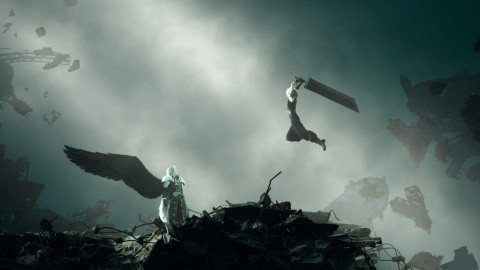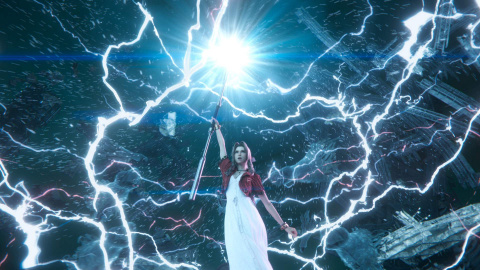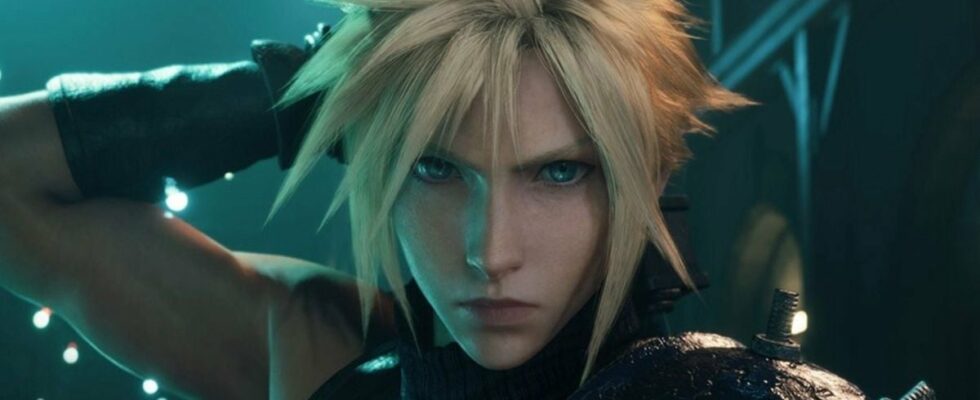Game news Final Fantasy must deny its origins to renew itself in the face of competition
In more than a month, Final Fantasy VII Rebirth is released, and the least we can say is that the hype is there. Conversely, Final Fantasy XVI, available since last summer, did not meet with the expected reception. Faced with this observation, shouldn’t Final Fantasy deny its founding principle to regain its former success?
A point of view story
This article is an opinion post, it is inherently subjective. The author’s opinion is personal and is not representative of that of the rest of the JV editorial team.
2024 is an important pivotal year for Final Fantasy. The franchise starts strong with the release of Final Fantasy VII Rebirth on February 29, before continuing with the second DLC of Final Fantasy XVI, The Rising Tide, in the spring then with the next expansion of Final Fantasy XIV, Dawntrail, at the summer. On top of all this, the Final Fantasy IX anime and the famous remake that has been rumored for years could also be announced this year.
Suffice it to say that there is plenty to do and that 2024 presents itself as even more fruitful for the saga than 2023. In my eyes, this is partly due to the hype for FFVII Rebirth which is much greater than that around FFXVI which was not as successful as hoped. And it was after this observation that I came to the following reflection on the license: what if Final Fantasy renounced its founding principle of renewing itself with each episode to perfect the same formula over several games? Let me explain.
See Final Fantasy VII Rebirth on Amazon
What if Final Fantasy had found the perfect formula?
Since its announcement, Final Fantasy VII Rebirth is the subject of great enthusiasm among players. As a reminder, the title still won the award for most anticipated game of 2024 during the Game Awards ceremony. It must be said that it is the direct sequel to Final Fantasy VII Remake which was very well received and that it also addresses its biggest negative point: linearity. To correct this defect, Rebirth promises to be more open than ever with a rich open world and exploration-based side quests. In other words, a fairly rare thing for the franchise which has always had difficulty with open worlds. Final Fantasy XIII was very linear, Final Fantasy XV featured an empty open world, and Final Fantasy XVI is a mix of the two. If we add to this the graphics and especially the particularly successful gameplay of FFVII Remake, then we can say that Rebirth has all the elements to be the modern Final Fantasy that fans have been dreaming of for years.
Unfortunately, the same cannot be said of Final Fantasy XVI, which is far from being a failure with its 3 million sales and its score of 87 from Metacritic. Despite its qualities, FFXVI was not able to get everyone to agree, both early fans and the general public. Conversely, Rebirth was the subject of much greater excitement than FFXVI before its release. Obviously, several elements can explain this, such as the capital sympathy of players for the well-known universe of FFVII. But Wouldn’t part of this enthusiasm be linked to the fact that the Final Fantasy saga found the perfect formula with the FF7 remake project?
See Final Fantasy XVI on Fnac
Is denying your origins really a good idea?

Since the release of Remake in 2020, players are full of praise for the quality of its combat system, which is unanimously praised. And yet, if we follow the logic of the saga, these mechanics should be abandoned for the next main episode in order to offer something new and constantly renew itself. Obviously, this is not the case here because if Final Fantasy VII Remake is almost an opus numbered by its importance, it is part of a separate project which forms a trilogy. It is therefore without too many surprises that Rebirth and the third game in this series will use these systems. However, if the developers of FFVIIR, CBU1, took care of Final Fantasy XVII, the logic of the franchise would dictate that all these mechanics be put aside to create new ones. But ultimately, wouldn’t that be a bit of a shame?

Like other major J-RPG series like Dragon Quest or Tales Of, one could imagine that Final Fantasy would rely in the future on a single formula which would be refined with each new episode. Obviously, this would be accompanied by new mechanics and a new universe to make everything relevant. At first glance, the idea is interesting to guarantee the success of all games without taking the risk of developing gameplay that does not appeal to the majority. But on the other hand, this constant risk-taking and renewal is precisely what has made the DNA of Final Fantasy since its beginnings, both in terms of gameplay and universe. Because of this, she has been able to stay relevant for over 35 years. Wouldn’t agreeing to stay with a single formula amount to purely and simply denying its origins? The question has the merit of being asked for the future of the saga. As for the mechanics of the Final Fantasy VII remake project, they will have been used across three games, which is already exceptional in the history of the franchise, so let’s take advantage of it.
This page contains affiliate links to certain products that JV has selected for you. Each purchase you make by clicking on one of these links will not cost you more, but the e-merchant will pay us a commission. The prices indicated in the article are those offered by the merchant sites at the time of publication of the article and these prices are likely to vary at the sole discretion of the merchant site without JV being informed.
Learn more.
